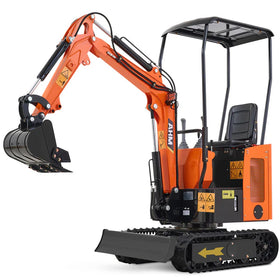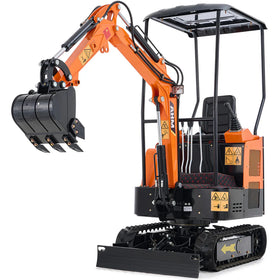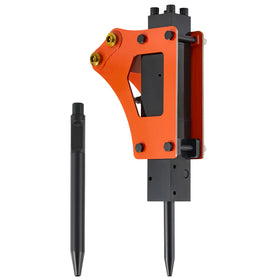
Mini excavators at auctions can be great deals, but they often need extra work before use. Without checking them properly, you might end up spending more money on repairs than you saved.
I had quite a few units come through my shop with seized engines after 2 hours because there wasn't any oil. I've replaced more engines than I should have because people bought from auctions and a connecting rod left the chat almost immediately after getting it home.
This issue happens frequently with auction purchases; a bargain ended up to be a costly mistake.
Why People Choose Auction Mini Excavators
The biggest reason people buy from auctions is the price. You can often save 30-50% compared to buying new from a dealer. For someone on a budget or starting a small business, this savings can make a big difference.
Other benefits of auction buying include:
- Finding older models that are no longer sold by dealers
- Getting equipment faster than waiting for new orders
- Avoiding sales pressure from dealerships
- Finding rare or specialized equipment
Auction Mini Excavators Almost Never Come Ready To Run

The biggest danger with auction mini excavators is their lack of preparation.
When you buy from an auction house, no one takes responsibility for pre-delivery preparation. Auction staff may run equipment with minimal or no oil just to show it works for a few minutes.
Some excavators come completely dry from the factory. Unlike machines purchased through established dealers, these auction excavators receive zero preparation before being handed over to buyers.
Auction units, regardless of price, leave you completely on your own for this critical preparation.
On the contrary, when you buy an AHM mini excavator, it comes fully prepped with all fluids at proper levels, inspected by trained technicians, and ready for immediate use.
Critical First Steps For Auction Mini Excavator Buyers

If you do purchase a mini excavator at auction, these first steps can save you thousands in repair costs:
1. Check Engine Oil Before Starting
Before turning the key on any auction mini excavator:
- Locate and pull the engine oil dipstick
- Verify oil is at the proper level on the dipstick
- Add appropriate engine oil if the level is low
- Never start the engine until confirming proper oil level
One customer shared a shocking photo of barely any oil draining from a brand new mini excavator he'd uncrated. Had he started it without checking, the engine would have seized within minutes.
2. Complete Fluid Level Inspection

Beyond engine oil, check these additional fluid levels:
- Hydraulic fluid using the sight gauge
- Coolant level in the radiator or overflow tank
- Final drive oil levels
- Inspect for any fluid leaks underneath the machine
3. Mini Excavator Engine Inspection
When checking the engine compartment:
- Examine belts for fraying or excessive wear
- Look for cracked lines or hoses
- Check oil color (dark, thick oil indicates poor maintenance)
- Inspect for excessive soot or smoke
- Test battery connections for corrosion
4. Operational Test Procedure
If fluid levels are correct and inspection shows no obvious problems:
- Start the engine and let it warm up slowly
- Test all hydraulic functions for smooth operation
- Verify tracks operate correctly in both directions
- Check cab rotation for smooth movement
- Listen for unusual noises during operation
How To Research Mini Excavator Auctions
1. Types of auctions where mini excavators are sold
Mini excavators appear at several types of auctions.
Government surplus auctions sell equipment from local, state, and federal agencies.
Construction company liquidations offer machines when businesses close or upgrade their fleet.
Equipment-specific auctions hosted by companies like Ritchie Bros or IronPlanet specialize in heavy machinery.
Farm auctions occasionally include mini excavators when farmers downsize or liquidate equipment.
2. How to find legitimate auction listings online
Start with established auction platforms like Ritchie Bros, IronPlanet, and Machinery Trader that verify sellers and equipment.
Search engines with terms like "mini excavator auction near me" can reveal local events.
Subscribe to auctioneer email lists for advance notice of upcoming sales. Also, Industry-specific forums often share information about upcoming equipment auctions.
Furthermore, always verify the auctioneer's credentials and history before participating, and check reviews from past buyers when available.
3. Setting a realistic budget including potential repairs
Begin with the maximum auction price plus buyer's premium (typically 5-18% of the winning bid).
Factor in transportation costs from the auction site to your location, which can be substantial for heavy equipment. Budget for immediate post-purchase maintenance like fluid changes, filters, and basic repairs.
Research common failure points for the model and include potential repair costs in your budget. Remember that financing options for auction purchases are limited compared to dealer sales, often requiring full payment at time of purchase.
Dealer Support vs Auction Purchases

While auction prices appear lower upfront, professionally prepared and dealer-supported mini excavators often cost less over time:
Preparation Differences
- Auction Units: No preparation, unknown history, as-is condition
- Dealer Units: Fully inspected, properly serviced, all fluids checked
Support After Purchase
- Auction Units: No support, warranty, or service assistance
- Dealer Units: Ongoing maintenance support, warranty coverage, technical expertise
Long-term Value
- Auction Units: Potential for major repairs, downtime, and hidden costs
- Dealer Units: Better reliability, documented history, higher resale value
Making Your Decision
Think about your situation:
- If you have mechanical skills and tools, auctions might work well for you
- If you need the machine working right away, dealers offer more security
- For tight budgets, auctions can make sense if you plan for possible repairs
- Consider how long you need the machine to last
Conclusion
If you still decide to purchase at auction, follow these buyer protection steps:
- Arrive early to thoroughly inspect potential machines
- Bring tools and equipment to check fluid levels
- Budget for immediate maintenance after purchase
- Research the specific model for common problems
- Consider the total cost including potential repairs, not just the purchase price
The cheapest machine is rarely the best deal in the long run. Buy what fits your budget, but be prepared to put some work into an auction purchase.
After weighing the pros and cons of auction purchases, you might decide you prefer the peace of mind that comes with dealer support.

If reliability and immediate use matter most to you, AHM offers fully-inspected mini excavators with 1-year warranty coverage and a demo room where you can test equipment before buying. For many buyers, the slightly higher upfront cost is worth avoiding the uncertainty of auction purchases.
Whatever you choose, make sure it fits both your budget and your comfort level with equipment maintenance.







